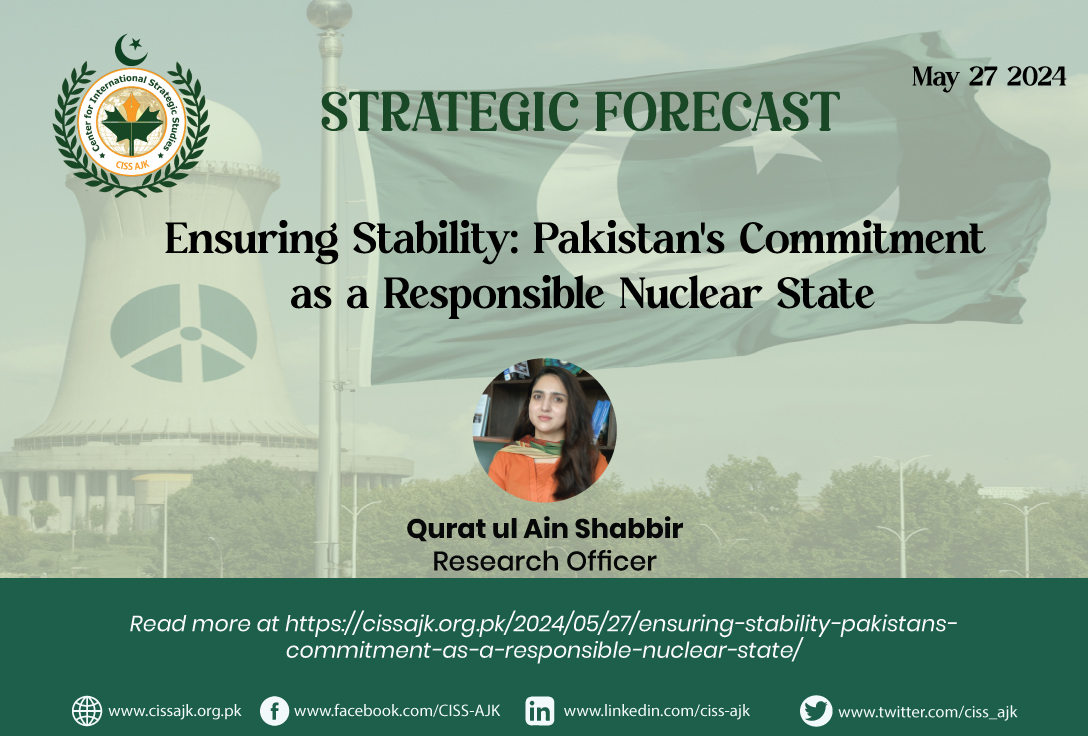Pakistan is a responsible nuclear state. Since its first nuclear tests in 1998, the country has developed a comprehensive command and control system to ensure the safety and security of its nuclear arsenal. The establishment of the National Command Authority (NCA) provides civilian oversight and stringent control over all strategic nuclear forces and policies.
For over two decades, Pakistan has relied on nuclear weapons to deter Indian aggression. However, a well-defined nuclear deterrence strategy only emerged after Pakistan’s nuclear tests in May 1998, which were in response to India’s surprise nuclear tests earlier that month.Post-1998, Pakistani defense planners recognized the need for a comprehensive approach to national security based on nuclear capabilities. This realization led to the development of new doctrines, command and control structures, force structures, delivery systems, and the specialized training and vetting of personnel assigned to strategic responsibilities.
Pakistan has implemented extensive security measures and engaged in international efforts to enhance nuclear security. These initiatives include the physical protection of nuclear facilities, personnel reliability programs, and cooperation with global initiatives such as the Nuclear Security Summits.
The Strategic Plans Division (SPD) manages the operational aspects of Pakistan’s nuclear forces, ensuring safety, security, and effective command and control.Additionally, Pakistan advocates for a strategic restraint regime in South Asia, proposing mutual non-deployment of ballistic missiles and the avoidance of destabilizing weapon systems. Despite regional tensions, Pakistan’s approach to its nuclear arsenal underscores its commitment to responsible management and adherence to global nuclear security norms.
Pakistan’s nuclear weapons policy is explicitly India-centric, aimed solely at deterring India from engaging in any coercive political-military actions that could threaten Pakistan’s territorial integrity and political sovereignty. Pakistan has clearly stated that its nuclear weapons would not be used against any other country. Despite the significance of its nuclear arsenal, Pakistani defense planners still view their conventional armed forces as the primary line of defense against an Indian conventional military attack. A robust conventional military capability forms 95 percent of Pakistan’s strategic deterrent, bolstered by the leadership’s readiness to employ it decisively if attacked or seriously threatened. Pakistan’s focus on a credible nuclear deterrent and a strong conventional military presence deters aggression and prevents escalation, contributing to a stable regional security environment.
Pakistan’s insistence on escalation dominance across the spectrum of conflict ensures strategic stability in South Asia. This strategy not only safeguards Pakistan’s sovereignty but also promotes a stable security environment in the region by preventing escalation and maintaining a balance of power with India. A key point that emerges from Pakistan’s deterrence strategy is the critical connection between its conventional military force and nuclear capabilities. Pakistani defense planners firmly believe that maintaining escalation dominance at every level of military conflict—from low-intensity skirmishes to full-scale conventional war and potentially nuclear conflict—is essential for the country’s survival in the region. This belief stems from the conviction that any advantage gained by India at any rung of the military ladder would be exploited to Pakistan’s detriment, threatening its territorial integrity and political sovereignty.
This comprehensive approach to deterrence underscores Pakistan’s commitment to strategic stability in South Asia. The aim is to prevent any miscalculation or aggressive move by India that could escalate into a larger, more destructive confrontation. The integration of robust conventional forces with a credible nuclear deterrent creates a layered defense strategy that complicates any potential Indian aggression, thereby maintaining a security balance in the region.
India’s ongoing military modernization, particularly its enhancements in intelligence, surveillance, and reconnaissance (ISR) capabilities and precision strike technologies, has escalated these concerns for Pakistan. With acquisitions such as the Phalcon Airborne Warning and Control System (AWACS), surveillance radars, unmanned aerial vehicles (UAVs), and advanced aircraft like the Su-30 and Mirage 2000-5, India is steadily increasing its ability to locate and target strategic sites within Pakistan with high accuracy. This growing disparity in technological capabilities could potentially allow India to conduct precision attacks with devastating effectiveness, further compelling Pakistan to rely on its nuclear deterrent as a counterbalance.
The strategic stability of South Asia hinges on the delicate balance of power between India and Pakistan. As India’s conventional capabilities advance, Pakistan’s need to maintain a credible deterrent becomes even more pronounced. This situation underscores Pakistan’s nuclear weapons policy. By maintaining a robust conventional military and a credible nuclear deterrent, Pakistan seeks to prevent any miscalculations or aggressive moves by India that could escalate into a larger, more destructive conflict. Despite India’s increasing technical superiority in ISR and precision targeting, Pakistan’s comprehensive defense strategy and commitment to responsible nuclear stewardship play vital roles in maintaining regional stability.
Pakistan’s strategic approach, which emphasizes the integration of conventional and nuclear forces, ensures that it remains a responsible nuclear state dedicated to regional stability. By addressing the growing conventional military gap with India through a robust deterrence strategy, Pakistan aims to preserve strategic stability in South Asia and prevent an arms race or a lowering of the nuclear threshold. This balanced approach helps to maintain security in the region, deterring aggression and promoting peace.


